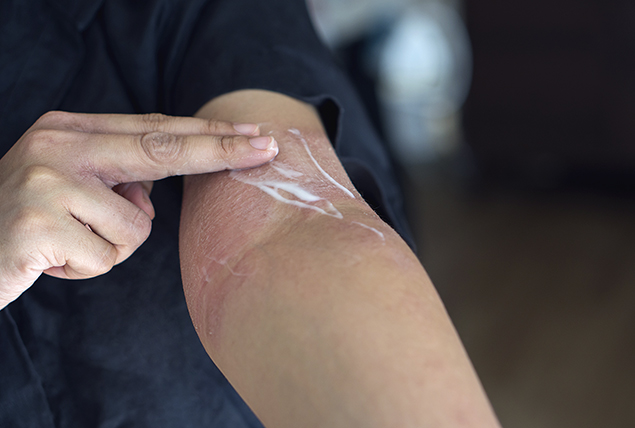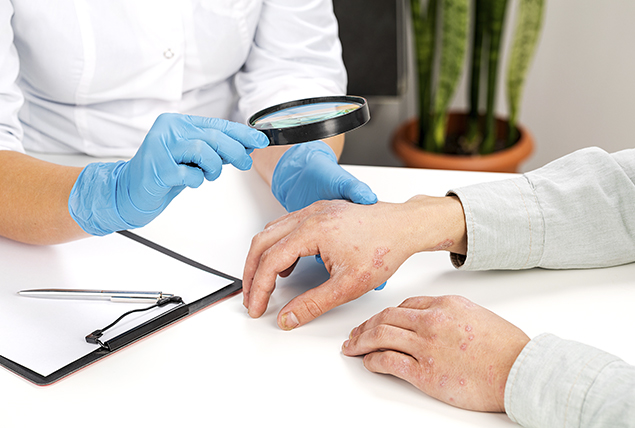How Do Doctors Diagnose and Treat Psoriasis?

Psoriasis is a chronic, autoimmune inflammatory condition that can affect your skin, joints and organs. About 2 percent to 3 percent of the world's population has psoriasis, including more than 8 million Americans.
It most commonly appears as raised, red patches of skin covered by silvery scales. Plaque psoriasis patches can appear anywhere on the body, but they usually show up on the scalp, knees, elbows, lower back and genitals.
"When it flares, plaque psoriasis can generally be flaky, itchy and painful," said Geeta Yadav, M.D., a Toronto-based dermatologist at FACET Dermatology. "As it resolves, it can leave areas of hyper- and hypopigmentation. Usually, this resolves, but the speed of improvement depends on your background skin color, as well as the skin site that is affected."
Other forms of psoriasis include the following:
- Guttate psoriasis, which appears as small, pink, droplet-shaped lesions on your skin
- Inverse psoriasis, or shiny, red lesions in folds of the skin like in the armpits, groin and under your breasts
- Pustular psoriasis, a rare type of psoriasis that appears as pus-filled blisters on your skin
"Pustular psoriasis can occur anywhere on the body, but it most commonly appears on the hands and feet," said Vladyslava Doktor, D.O., a dermatologist and the owner of Skin Center Boston. "While the pus does not contain an infection, it can cause flu-like symptoms, including chills, a fast heartbeat, fever, weakness in muscles and appetite loss."
If you experience any symptoms indicative of psoriasis, medical professionals recommend making an appointment with your doctor as soon as possible. Psoriasis can be quickly and painlessly diagnosed. Modalities to treat and manage the condition run the gamut from natural supplements to topical medications to light therapy.
"As soon as you suspect you might have psoriasis, you should seek the evaluation of a dermatologist," Yadav said. "Psoriasis can dramatically affect quality of life, so there is no reason not to pursue treatment as soon as possible."
What if psoriasis goes untreated?
The common autoimmune condition has no cure. Even so, obtaining a diagnosis and undergoing treatment for psoriasis leads to better long-term patient outcomes.
"While psoriasis is not typically considered an urgent medical condition, early diagnosis and treatment can help manage symptoms and prevent the condition from worsening," Doktor said. "Psoriasis can have a significant impact on a person's quality of life, including their mental and emotional well-being. Seeking treatment early can help minimize these effects."
One sign it may be time to seek medical care, according to Doktor, is the development of persistent red, scaly patches of skin. Another is if over-the-counter treatments are not effective in managing symptoms.
Though rare, life-threatening dangers can arise from leaving psoriasis untreated.
"It may sound crazy to hear that untreated psoriasis can lead to a heart attack, but the cells causing inflammation in the body travel and can lead to heart problems and many more concerns," Yadav said. "Letting psoriasis go untreated or undiagnosed increases your risk for developing other conditions, including heart disease, metabolic disorders, type 2 diabetes, Crohn's disease, lymphoma and psoriatic arthritis."
Psoriatic arthritis can become increasingly painful and cause challenges to daily tasks—even things as simple as walking or holding a pen.
How is psoriasis diagnosed?
Dermatologists can make a confident psoriasis diagnosis in a matter of minutes. Sometimes, though, taking a biopsy is helpful.
"Diagnosis should be fairly simple for most dermatologists. They will examine your skin, including on your scalp and nails, looking for tell-tale symptoms of psoriasis," Yadav said. "They may also take a small biopsy to analyze your skin. This usually isn't necessary but can be helpful in cases when [it looks] like other scaly, red rashes."
Sometimes, patients with itchy, scaly plaques can confuse eczema for psoriasis, but dermatologists are trained to spot the differences.
"Psoriasis and eczema can have similar symptoms, such as red, itchy and scaly patches on the skin. Both conditions can be chronic and have periods of remission and flares," Doktor said. "The similarities in symptoms can sometimes make it difficult to distinguish between the two conditions, leading to misdiagnosis. However, eczema typically has a more diffuse pattern, while psoriasis tends to have well-defined plaques."
Pityriasis rosea is another condition that can commonly be mistaken for psoriasis, as the skin can look similar with both conditions, according to Fred Pescatore, M.D., a New York City-based family medicine physician and author who specializes in nutrition.
How is psoriasis treated?
Doktor said many patients with psoriasis experience reduced symptoms and a marked improvement in their quality of life during a treatment regimen recommended by their physician. A doctor's guidance can help patients achieve long-term control of their condition.
"We are in the golden age of treatment for psoriasis," Doktor said. "We have several options available, including biologics and new oral medications, as well as potentate topical corticosteroids."
Treatment modalities to manage symptoms of the condition include topical medications, dietary supplements, light therapy and systemic therapies.
Topical treatments
Your doctor's first recommendation might be a topical medication, either over-the-counter or prescription strength, according to Yadav. Steroids are one of the most common choices, as they inhibit inflammation and discoloration.
"Formulas using coal tar and salicylic acid are keratolytic, meaning they help break down flakes and scales," she said. "Vitamin A derivatives can also help."
Light therapy
Light therapy can be used to treat psoriasis but should only be performed by a dermatologist.
"Narrow-band UVB phototherapy slows the growth of affected skin and reduces flare symptoms," Yadav said. "However, many patients take this treatment into their own hands by getting unprotected sun exposure, which increases their risk of skin cancer."
Systemic therapies
Oral and injectable medications, sometimes called systemic or advanced therapies, are prescribed to patients who have not seen improvement from topical treatments or light therapy, according to Yadav. They work throughout the whole body to fight psoriasis.
"These include oral retinoids, which work by regulating the rate at which skin cells grow and shed; immunosuppressive drugs; and biologics, or oral JAK inhibitors, which work to control the inflammation specific to psoriasis," she said. "Some of these are also antirheumatic drugs, which means they slow joint damage, making them ideal for those with psoriatic arthritis."
A new supplement
Pycnogenol is a natural plant extract derived from French maritime pine tree bark. One study suggested it can improve the painful and visible symptoms of psoriasis, including redness, flaking, thickness and the total surface area of affected skin patches, Pescatore said.
"Psoriasis flares root back to your body's inflammatory response, so seek ingredients that can support inflammation," he added.
There's no cure for psoriasis, but flares can be prevented or managed
For many patients, psoriasis is an unpredictable condition that can be difficult to manage, Doktor said, but taking steps to improve your quality of life and reduce the impact of psoriasis symptoms is possible.
Avoiding triggers is one step psoriasis sufferers can take to manage the condition. In addition, lifestyle modifications can reduce the severity and frequency of psoriasis symptoms, according to Doktor. These include:
- Maintaining a healthy weight
- Quitting smoking
- Finding ways to manage stress
- Working with a healthcare provider to develop an individualized treatment plan;
"While there is no cure for psoriasis, taking these steps can improve quality of life and reduce the impact of the condition on your daily activities," she said.


















